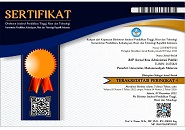POLICY STREAM DALAM TAX AMNESTY UNDANG-UNDANG NOMOR 11 TAHUN 2016
Abstract
The tax amnesty policy stream carried out by the Government is not optimal, this is based on the reference to Article 2 paragraph 2 contained in Law Number 11 of 2016, where the indicators are unstable domestic liquidity, not improving the rupiah exchange rate, not the extreme decline in interest rates, did not increase investment and a significant tax base. The purpose of this study is to look at the policy stream in the tax amnesty law number 11 of 2016. The method used is a qualitative research method by analyzing phenomena. The results of this study are that the tax amnesty policy stream carried out by the Government is not optimal, this is based on the reference to Article 2 paragraph 2 contained in Law Number 11 of 2016, where the indicator is unstable domestic liquidity, not the improvement in the rupiah exchange rate, no extreme decline in interest rates, no significant increase in investment and tax base.
Keywords
Full Text:
PDFReferences
H. Insan, I., & Maghijn, T. N. (2018). Penerapan Pengampunan Pajak (Tax Amnesty) Di Indonesia Berdasarkan Undang-Undang Nomor 11 Tahun 2016 Beserta Permasalahannya. Palar | Pakuan Law Review, 4(2), 242–311. https://doi.org/10.33751/.v4i2.884
Hadzil, H., Syahbandir, M., & Hasyim, S. (2019). Tinjauan Yuridis Akibat Berlakunya UU No. 11 Tahun 2016 Tentang Pengampunan Pajak Terhadap Sanksi Pidana Perpajakan. Syiah Kuala Law Journal, 3(2). https://doi.org/10.24815/sklj.v3i2.12084
Zitri, I. (2020). Akuntabilitas Pemerintahan Desa Benete dalam Pengelolaan Anggaran Pendapatan dan Belanja Desa (APBDes). Gorontalo Journal of Government and Political Studies, 3(2), 070-087.
Inayah, A. N. (2018). Analisis Implementasi Kebijakan Tax Amnesty dalam Upaya Meningkatkan Kepatuhan Wajib Pajak. Lentera Akuntansi, 3(1).
Moleong, J. L. (2020). metodologi penelitian kualitatif J lexy Moleong. Jurnal Ilmiah.
Perry, J., & Kingdon, J. W. (1985). Agendas, Alternatives, and Public Policies. Journal of Policy Analysis and Management, 4(4). https://doi.org/10.2307/3323801
Pratama, I. N., & Mutiarin, D. (2019). FORMULASI KEBIJAKAN TAX AMNESTY UNDANG-UNDANG NOMOR 11 TAHUN 2016. Journal of Governance and Local Politics, 1(1). https://doi.org/10.47650/jglp.v1i1.15
Sa’adah, N. (2018). KEBIJAKAN PENGAMPUNAN PAJAK (TAX AMNESTY) BERDASARKAN KEADILAN YANG MENDUKUNG IKLIM INVESTASI INDONESIA. Masalah-Masalah Hukum, 46(2). https://doi.org/10.14710/mmh.46.2.2017.182-189
Safri. (2020). Efektifitas Program Tax Amnesty Jilid Ii Dan Faktor Keberhasilan Dan Permasalahan: Pelajaran Dari Tax Amnesty Jilid I. Jurnal Mitra Manajemen, EFEKTIFITAS PROGRAM TAX AMNESTY JILID II DAN FAKTOR KEBERHASILAN DAN PERMASALAHAN: PELAJARAN DARI TAX AMNESTY JILID I.
Sayidah, N., & Assagaf, A. (2019). Tax amnesty from the perspective of tax official. Cogent Business and Management, 6(1). https://doi.org/10.1080/23311975.2019.1659909
Suratno, S., Ahmar, N., Tampubolon, M. N. H., & Sumarsyah, R. (2020). Pengembangan Model Efektifitas Kebijakan Ekonomi Berbasis Tax Amnesty untuk Meningkatkan Kepatuhan Wajib Pajak di Indonesia. Jurnal Riset Akuntansi & Perpajakan (JRAP), 7(02). https://doi.org/10.35838/jrap.v7i02.1836
DOI: https://doi.org/10.31764/jiap.v10i2.12407
Refbacks
- There are currently no refbacks.
JIAP (Jurnal Ilmu Administrasi Publik)

This work is licensed under a Creative Commons Attribution-ShareAlike 4.0 International License.
JIAP (Jurnal Ilmu Administrasi Publik) terindeks di:
EDITOR'S OFFICIAL:














.JPG)



.JPG)